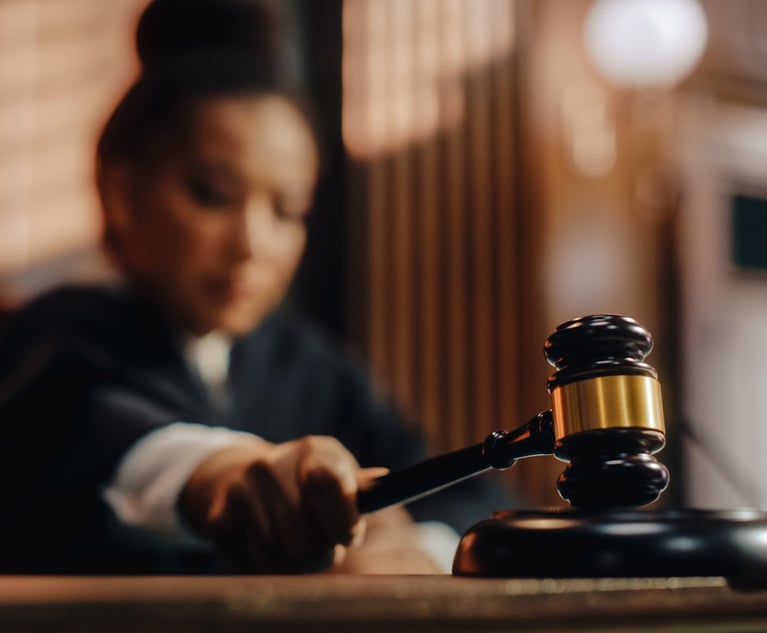Change in DA's Office Will Include New Look at Sex Harassment Prevention, Krasner Says
Philadelphia District Attorney-elect Larry Krasner was voted into office on a platform of reform, and, speaking for the first time publicly since announcing his transition leadership team, he said overhauling the office's sexual harassment policies should be part of that change.
December 21, 2017 at 05:41 PM
5 minute read
 Larry Krasner.
Larry Krasner.
Philadelphia District Attorney-elect Larry Krasner was voted into office on a platform of reform, and, speaking for the first time publicly since announcing his transition leadership team, he said overhauling the office's sexual harassment policies should be part of that change.
Krasner spent more than an hour Wednesday evening talking to a crowded meeting of the Philadelphia Bar Association's criminal justice section about his transition efforts so far and his vision for the office once he takes over.
The discussion touched on everything from his plans to cut bureaucratic red tape within the office to how he will instruct members of the office to handle potentially exculpatory evidence subject to disclosure under Brady v. Maryland, but he began the meeting with a frank discussion about he characterized the lack of “robust” sexual harassment prevention policies in the District Attorney's Office.
Krasner relayed a particularly harsh assessment of the former district attorney, saying that one person he spoke with said former District Attorney R. Seth Williams had “treated the office like he was Caligula.” Williams, who pleaded guilty to a bribery charge in June, had been criticized during his tenure for numerous issues related to sexual harassment and conduct, including failing to swiftly discipline several prosecutors found to have sent sexually explicit emails during their time at the state Attorney General's Office, failing to file charges when an alleged sexual assault occurred during the 2016 Democratic National Convention and urging staff to attend a fundraiser titled “Seth in the City.”
Krasner spoke for several minutes about the need for a more comprehensive sexual harassment policy, saying he's spoken with roughly a dozen people in the office who said the policy, which has been in place since 2005, needs to be revamped.
“It's obviously not something we talked about in the campaign, but to me that's a really important topic,” he said.
Audience members Wednesday also peppered Krasner with questions about the administrative and policy changes he foresees under his tenure.
Although Krasner did not outline any specific plans for the office, he did make clear that, when he officially takes over the office Jan. 2, he will evaluate the ”explosion” of supervisors that he said went from 12 to 50 during Williams' tenure.
When questioned about whether he would be firing current staff, Krasner did not give specifics but he did say there will be some staff changes. He said Pennsylvania Attorney General Josh Shapiro dismissed 60 total staff members, including 40 lawyers, when he took over an office of a similar size last year, and noted that he had been elected on a mandate for change. Personnel changes would be a necessary part of that, he said.
“It might be nice to go in there and say you can all have your jobs, you're nice people, you've done the right thing, it's OK, but that's not what you're going to do,” he said.
Much of the discussion focused on what he sees as problems within the office. He spoke about potentially consolidating the office layout to encourage more access between the line prosecutors and supervisors, and also talked about possibly adjusting the zone prosecution system, which he said often siloed prosecutors and led to biased evaluation of subordinates.
When asked what his office might prosecute more aggressively, he said the office would seek to do more with crimes against the elderly, including fraud and identity theft, and would seek to prosecute more cases involving fraudulent deeds.
He also said he wanted to increase training for line ADAs before they try their first case, and that, in certain cases, he might have prosecutors deviate downward from the sentencing guidelines to avoid situations where a defendant might face significantly more prison time for not taking a plea agreement.
Regarding Brady material, Krasner said he expects that, under his leadership, the office will have an expansive view of what materials should be turned over to defense attorneys, saying that bringing potentially exculpatory evidence to light can avoid unnecessary trials. He also said the problem of withholding the evidence can come on both sides, where defense lawyers might be reluctant to turn over exculpatory information early in a case for fear that the information might be destroyed or an alibi witness coerced into not coming.
Improving the trust between the prosecutors and defense bar, he said, would go a long way toward changing that dynamic.
“There's not trust. Information is not shared,” he said, adding that he would encourage more participation in the bar association's criminal justice section, which is mostly composed of defense attorneys.
This content has been archived. It is available through our partners, LexisNexis® and Bloomberg Law.
To view this content, please continue to their sites.
Not a Lexis Subscriber?
Subscribe Now
Not a Bloomberg Law Subscriber?
Subscribe Now
NOT FOR REPRINT
© 2025 ALM Global, LLC, All Rights Reserved. Request academic re-use from www.copyright.com. All other uses, submit a request to [email protected]. For more information visit Asset & Logo Licensing.
You Might Like
View All
Phila. Court System Pushed to Adapt as Justices Greenlight Changes to Pa.'s Civil Jury Selection Rules
5 minute read
Pa. Appeals Court: Trial Judge Dismissed Med Mal Claims Without Giving Plaintiffs Proper Time to Fight Back
4 minute read
Phila. Judge Upholds $68.5M Verdict Over Construction Worker's Death
3 minute readTrending Stories
- 1'Merciless' Filing Deadline Dooms Cuban Americans' Property-Trafficking Suit Against BNP Paribas, SocGen
- 2In 2-1 Ruling, Court Clears Way for Decade-Old Wrongful Imprisonment Suit
- 3Trump Sentencing, TikTok Ban Welcome Justices Back to Work
- 4U.S. Eleventh Circuit Remands Helms-Burton Trafficking Case Involving Confiscated Cuban Port
- 5Can Passive Technology Change the Impaired Driving Trajectory?
Who Got The Work
Michael G. Bongiorno, Andrew Scott Dulberg and Elizabeth E. Driscoll from Wilmer Cutler Pickering Hale and Dorr have stepped in to represent Symbotic Inc., an A.I.-enabled technology platform that focuses on increasing supply chain efficiency, and other defendants in a pending shareholder derivative lawsuit. The case, filed Oct. 2 in Massachusetts District Court by the Brown Law Firm on behalf of Stephen Austen, accuses certain officers and directors of misleading investors in regard to Symbotic's potential for margin growth by failing to disclose that the company was not equipped to timely deploy its systems or manage expenses through project delays. The case, assigned to U.S. District Judge Nathaniel M. Gorton, is 1:24-cv-12522, Austen v. Cohen et al.
Who Got The Work
Edmund Polubinski and Marie Killmond of Davis Polk & Wardwell have entered appearances for data platform software development company MongoDB and other defendants in a pending shareholder derivative lawsuit. The action, filed Oct. 7 in New York Southern District Court by the Brown Law Firm, accuses the company's directors and/or officers of falsely expressing confidence in the company’s restructuring of its sales incentive plan and downplaying the severity of decreases in its upfront commitments. The case is 1:24-cv-07594, Roy v. Ittycheria et al.
Who Got The Work
Amy O. Bruchs and Kurt F. Ellison of Michael Best & Friedrich have entered appearances for Epic Systems Corp. in a pending employment discrimination lawsuit. The suit was filed Sept. 7 in Wisconsin Western District Court by Levine Eisberner LLC and Siri & Glimstad on behalf of a project manager who claims that he was wrongfully terminated after applying for a religious exemption to the defendant's COVID-19 vaccine mandate. The case, assigned to U.S. Magistrate Judge Anita Marie Boor, is 3:24-cv-00630, Secker, Nathan v. Epic Systems Corporation.
Who Got The Work
David X. Sullivan, Thomas J. Finn and Gregory A. Hall from McCarter & English have entered appearances for Sunrun Installation Services in a pending civil rights lawsuit. The complaint was filed Sept. 4 in Connecticut District Court by attorney Robert M. Berke on behalf of former employee George Edward Steins, who was arrested and charged with employing an unregistered home improvement salesperson. The complaint alleges that had Sunrun informed the Connecticut Department of Consumer Protection that the plaintiff's employment had ended in 2017 and that he no longer held Sunrun's home improvement contractor license, he would not have been hit with charges, which were dismissed in May 2024. The case, assigned to U.S. District Judge Jeffrey A. Meyer, is 3:24-cv-01423, Steins v. Sunrun, Inc. et al.
Who Got The Work
Greenberg Traurig shareholder Joshua L. Raskin has entered an appearance for boohoo.com UK Ltd. in a pending patent infringement lawsuit. The suit, filed Sept. 3 in Texas Eastern District Court by Rozier Hardt McDonough on behalf of Alto Dynamics, asserts five patents related to an online shopping platform. The case, assigned to U.S. District Judge Rodney Gilstrap, is 2:24-cv-00719, Alto Dynamics, LLC v. boohoo.com UK Limited.
Featured Firms
Law Offices of Gary Martin Hays & Associates, P.C.
(470) 294-1674
Law Offices of Mark E. Salomone
(857) 444-6468
Smith & Hassler
(713) 739-1250






